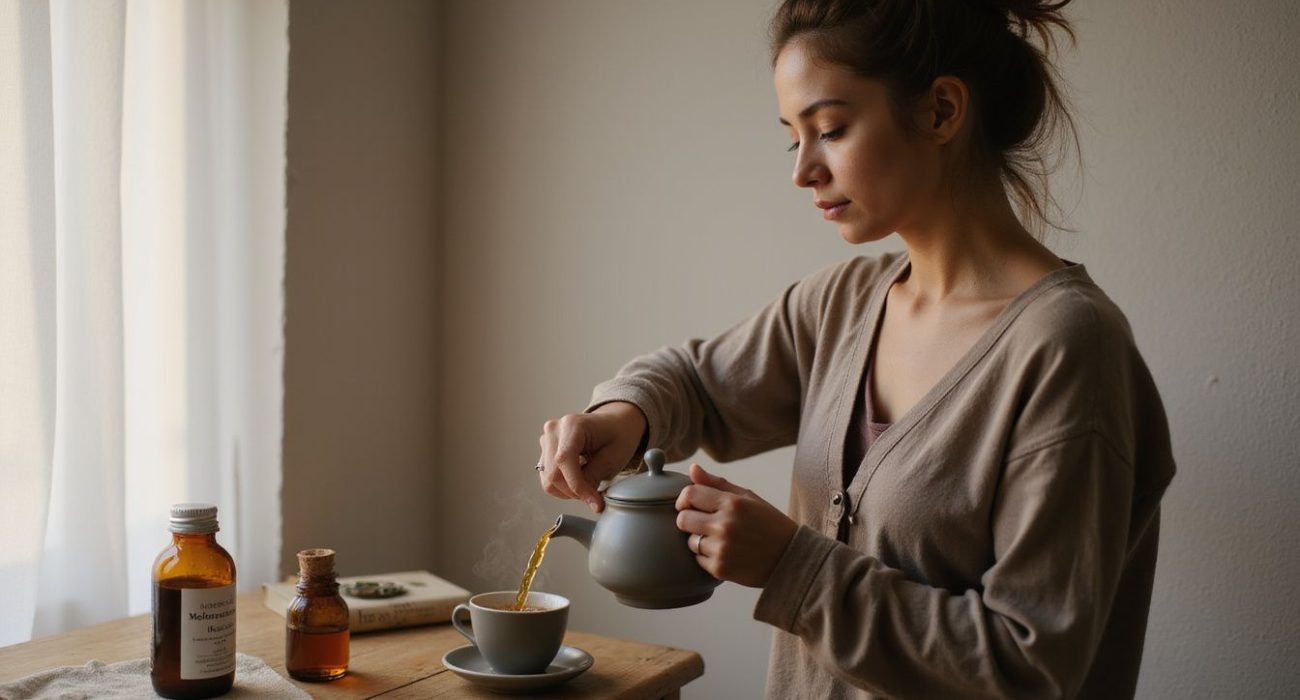Do you find it hard to fall asleep or stay asleep at night? Many people use natural sleep aids like herbal tea and melatonin supplements to help with sleep problems. This blog will compare sleep tea versus melatonin, explain how each one works, and help you choose the best option for restful nights.
Keep reading to learn which solution fits your needs for better sleep quality!
Overview of Sleep Tea
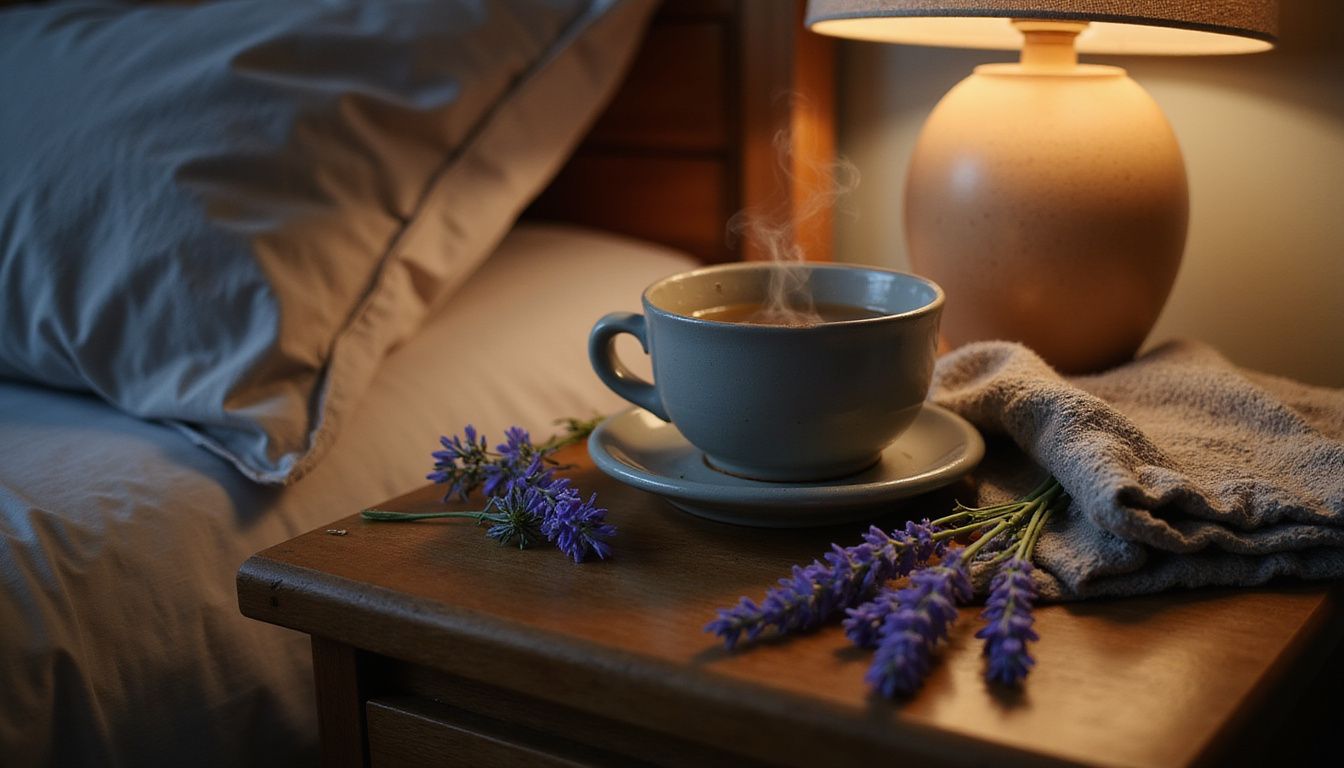
Sleep tea consists of various herbal ingredients known for their relaxing properties. These teas aid in promoting relaxation and improving sleep quality, making them a popular natural remedy for those struggling with sleep issues.
Common herbal ingredients in sleep teas
Sleep teas are a go-to for those facing challenges with sleep problems or experiencing difficulty in settling into sleep. These teas carry herbs identified to help soothe the body and mind.
- Chamomile: Scientifically referred to as Chamaemelum nobile, chamomile incites relaxation and assists in better sleep. A lot of individuals choose chamomile tea before nighttime for relaxation.
- Lemon balm: This herb comes with a minty flavor and has anxiety-reducing properties, helping your mind to unwind before sleep.
- Valerian root: Research suggests that valerian root might ameliorate sleep quality without leaving aftereffects in the morning. It operates by pacifying the brain’s activity.
- Lavender: The aroma of lavender is often associated with relaxation. Consuming lavender-infused tea can generate a soothing effect, facilitating easier sleep.
- Mint: Mint teas, inclusive of spearmint and peppermint, are devoid of caffeine and carry a calming effect on your stomach. This can considerably help if discomfort disrupts your slumber.
- Catnip: In spite of its invigorating effect on cats, catnip operates as a natural sedative in people. It’s part of the mint family and can assist in falling asleep quickly.
- Spearmint leaf: Comparable to peppermint, spearmint aids in alleviating indigestion, which occasionally interferes with sleep cycles. Its subtle taste also makes it an enjoyable night drink.
- Lemongrass leaf: This ingredient not just carries a revitalizing taste but also has calming properties that might help ease into sleep.
- Hawthorn berry: Hawthorn berry is used by people to back heart health, but its calming effect might also aid in improved sleep patterns.
These components illustrate how a variety of herbs focus on different facets of relaxation and sleep readiness, from soothing the mind to alleviating physical discomfort.
How sleep tea promotes relaxation and sleep
Chamomile tea helps people with sleep disorders and trouble sleeping. Its key compound, apigenin, attaches to GABA receptors in the brain. This action has effects similar to some relaxation techniques and mild sedatives like benzodiazepines.
Drinking a warm cup of herbal infusion eases anxious thoughts and relaxes muscles, making it easier to fall asleep.
Queen Elizabeth I enjoyed chamomile tea before bed for its soothing effects. Herbal teas such as Roman chamomile and German chamomile lower anxiety by calming nerves without using stimulants or antihistamine medication found in sleeping pills like diphenhydramine HCL or doxylamine succinate.
Many people enjoy this caffeine-free beverage as part of a nightly ritual that prepares both mind and body for restful NREM sleep without causing morning grogginess often linked with other sleep drugs.
Overview of Melatonin
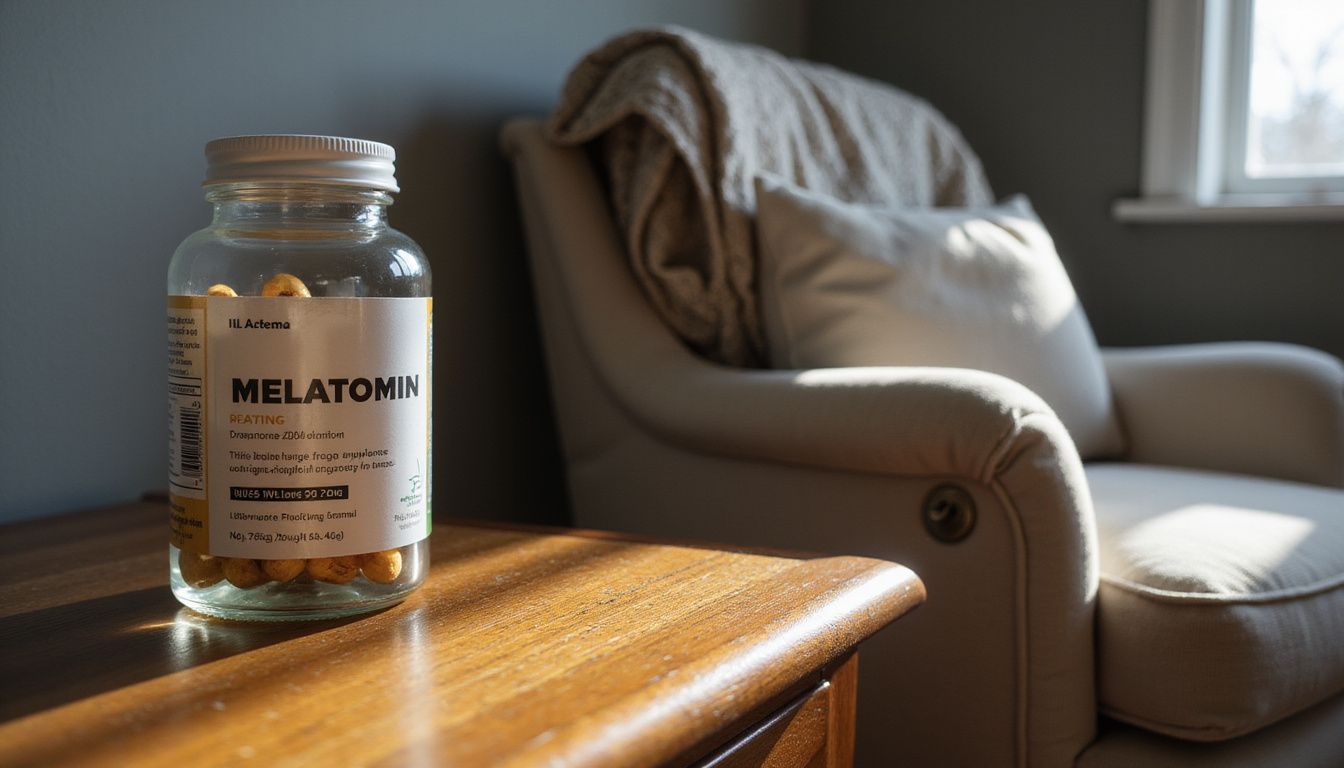
Melatonin is a hormone in your body that helps control sleep-wake cycles. There are melatonin supplements available, which come in various forms like tablets and herbal infusions.
What is melatonin and its role in sleep cycles
A small gland in the brain called the pineal gland creates melatonin. This hormone tells your body’s internal clock when it is time to sleep and wake up. Melatonin levels rise after dark, reaching their peak late at night.
They fall again as sunlight appears, helping control sleep-wake cycles.
Doctors often suggest melatonin for people with jet lag or delayed sleep phase syndrome. It also helps shift workers adjust their circadian rhythm to new schedules. Over-the-counter tablets come in different dosages for those who have trouble sleeping because of changes in routine or light exposure.
This natural remedy acts as a signal that helps you feel sleepy at bedtime and resets your sleep pattern if needed.
Melatonin supplements and their common forms
Melatonin is a popular sleep-aid available in various forms. People use it to fix their sleep cycles.
- Pills are the most common form of melatonin supplements. They are easy to find and simple to take. Start with low doses, such as 0.5mg.
- Liquid melatonin is another option. It works fast because your body absorbs it quickly. This form is good for those who don’t like swallowing pills.
- Gummies offer a tasty way to take melatonin. They come in many flavors and are especially popular with kids and adults who prefer not to swallow pills.
The effects of these supplements usually start within 30–60 minutes after taking them. Melatonin has been widely studied, making it accessible for most people looking for natural remedies to improve their sleep patterns.
Comparing Sleep Tea and Melatonin
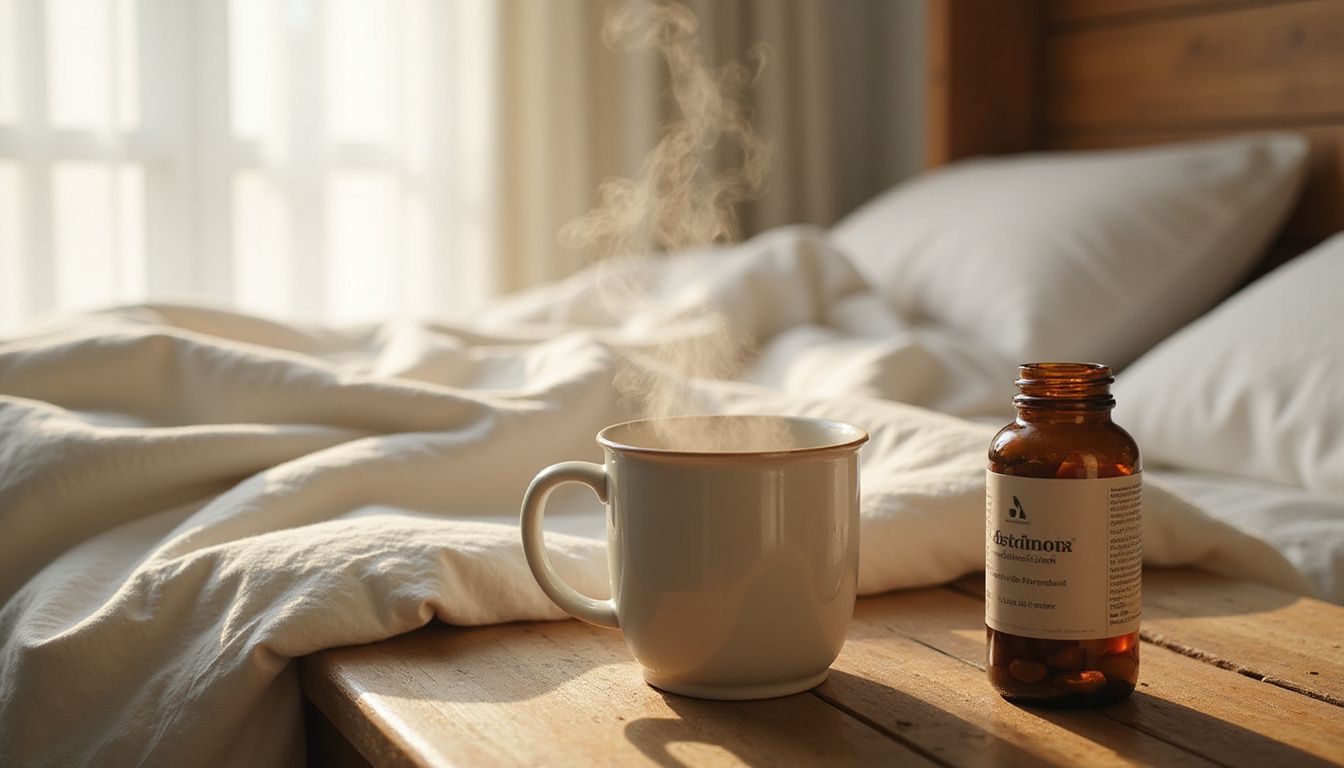
Sleep tea and melatonin differ in how they work to improve sleep. While sleep tea promotes relaxation, melatonin helps regulate sleep cycles. Their effectiveness varies for different types of sleep issues.
Differences in their mechanisms of action
Chamomile tea works by helping the body relax. Apigenin in chamomile attaches to gamma aminobutyric acid (GABA) receptors. These receptors help slow brain activity and lower stress, which can ease insomnia or difficulty falling asleep.
Chamomile acts on the benzodiazepine receptor system but does not make you dependent like muscle relaxers or opioid painkillers.
Melatonin supplements act in a different way. Melatonin is a hormone made naturally by your pineal gland in response to darkness and blue light changes at night. It tells your body when it is time for deeper sleep by controlling circadian cycles and signaling bedtime through direct action on sleep timing, not relaxation.
This makes melatonin useful for regulating disrupted sleep cycles caused by jet lag, shift work, PCOS, epilepsy, alcohol use, or breastfeeding schedules.
These two approaches show why people may choose herb tea for calming nerves or melatonin drinks for controlling their internal clock before bed; next let’s compare results with different types of sleeping troubles.
Sleep tea for relaxation vs. melatonin for regulating sleep cycles
Sleep tea uses herbal ingredients like Matricaria recutita, or chamomile, to promote relaxation and a sense of calm. Many people drink these decaffeinated beverages as part of a calming bedtime ritual.
Chamomile is helpful for those with anxiety or stress-related sleep issues. Herbs in loose leaf tea or teabags may also help with colds and allergies.
Melatonin works differently by acting as a neurotransmitter that signals the brain it is time for sleep. This supplement helps reset your internal clock; it can reduce jet lag symptoms after changing time zones quickly.
Melatonin is often best for short-term adjustments, including shift work or trouble falling asleep due to sudden schedule changes.
Chamomile relaxes the mind; melatonin resets the body’s clock.
Effectiveness for different types of sleep issues
Sleep tea and melatonin help with different sleep issues based on how they work. Herbal teas like chamomile boost relaxation and ease anxiety, which can improve sleep quality. People who feel nervous or restless at night find chamomile helpful for falling asleep faster and staying asleep longer.
Melatonin works best for problems linked to the body’s sleep cycle, such as jet lag or delayed sleep phase syndrome. Travelers crossing time zones often use melatonin supplements to adjust their internal clock.
Night shift workers also benefit from melatonin by improving sleep onset after unusual work hours. Using calming practices like progressive relaxation or meditation along with herbal teas may make bedtime more peaceful for those facing stress-related sleeplessness.
Melatonin does not treat depression but can support regular sleep patterns in people with certain health issues, including polycystic ovary syndrome or heart disease. Those sensitive to caffeine may prefer decaffeinated drinks made using the Swiss water process before bed to avoid extra stimulation.
Benefits of Sleep Tea
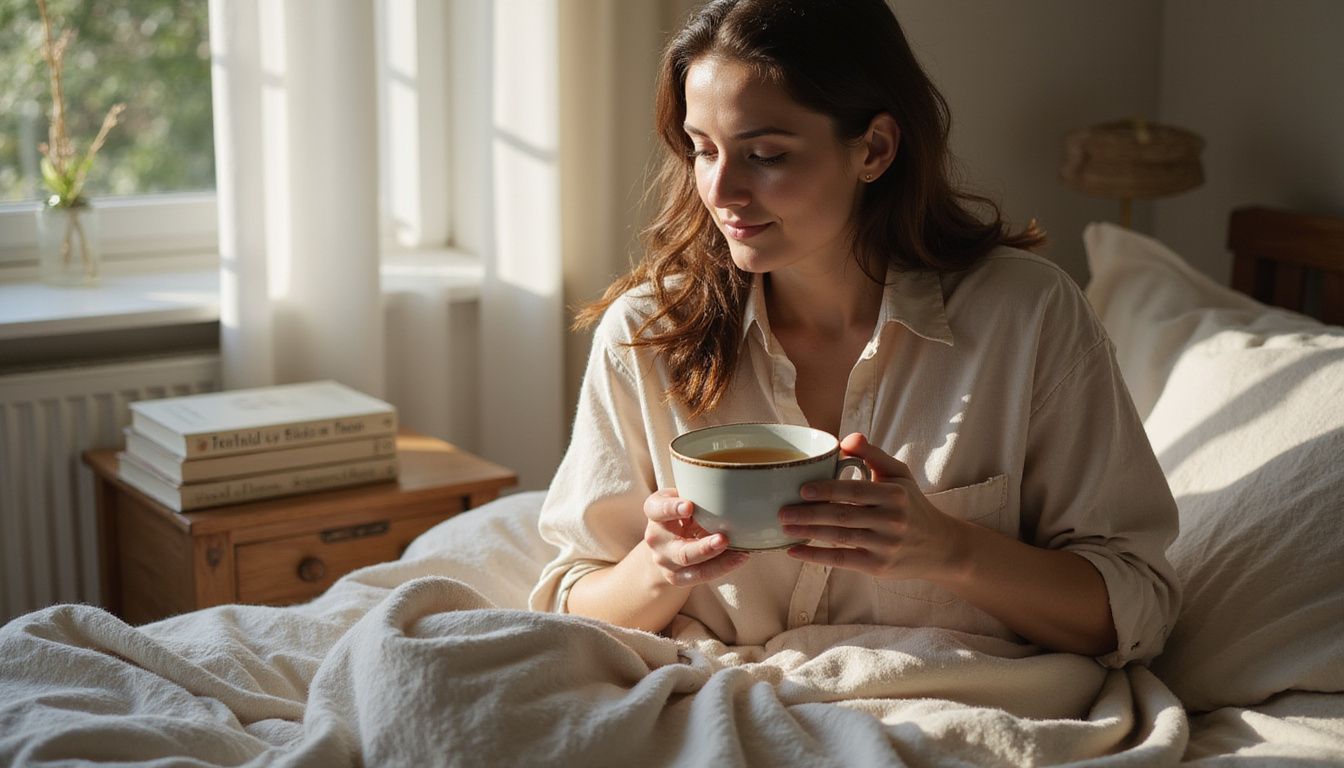
Sleep tea offers a natural and caffeine-free option for promoting relaxation and better sleep. It provides additional health benefits from herbal ingredients along with a pleasant taste, making it a comforting bedtime ritual.
Natural and caffeine-free option
Chamomile tea acts as a natural and caffeine-free choice for those with sleep issues. Many sleep teas also use herbal ingredients like lemon balm, valerian root, lavender, and mint.
These herbs do not contain caffeine or other stimulants that can hurt your rest. Ancient Egyptian medical texts list the benefits of chamomile for soothing nerves and improving sleepiness.
Experts in integrative medicine often suggest avoiding stimulants such as dark chocolate, nicotine, or even decaffeinated drinks near bedtime. One to two cups of herbal tea each night is generally safe for most people.
Herbal teas offer a gentle way to prepare you for bed without side effects linked to medications like zzzquil or marijuana products.
Herbal teas provide a simple path toward better sleep without adding chemicals to your nighttime routine.
Additional health benefits from herbal ingredients
Herbal sleep teas offer more than relaxation. Ingredients like lemon balm and mint may soothe digestion, while lavender helps lower stress levels. Apigenin, found in some flowers, eases anxiety and prepares the mind for rest.
Valerian root supports gentle muscle relaxation without acting as a benzodiazepine or causing grogginess.
Most herbal teas remain caffeine-free because they use decaffeinated leaves or flowers. Brewing tea “long and hot” boosts nutrient extraction for greater benefits. Unlike melatonin supplements, these teas often contain antioxidants that help protect cells from damage.
Drinking them creates a calming ritual that pairs well with other integrative medicine approaches like essential oils or cannabidiol (CBD).
Pleasant taste and calming bedtime ritual
Sleep tea offers a pleasant taste and soothing aroma, creating a calming bedtime ritual that signals the body it’s time to wind down. The warmth of the tea and its delightful scent can help set the stage for relaxation before sleep.
Chamomile, historically favored by Queen Elizabeth I for its sweetness, is just one example of an herbal ingredient that enhances both the flavor and relaxing qualities of sleep teas.
The concept entails using such teas as part of a nurturing nighttime routine; these simple acts signal bedtime to the brain and encourage relaxation, setting a stage conducive for peaceful slumber.
This simple act sets into motion the preparation for deep rest.
Benefits of Melatonin
Melatonin is effective for regulating sleep issues and can help with jet lag and shift work problems. Read more to find out about the benefits of melatonin.
Suitable for sleep regulation issues
Melatonin is suitable for regulating sleep. It helps reset internal clocks and can be effective for delayed sleep phase syndrome. When using melatonin, it’s important to start with low doses, such as 0.5mg, to avoid side effects.
Sleep tea may not be ideal for addressing significant sleep regulation issues due to its mechanism of action focusing on relaxation rather than directly influencing the sleep-wake cycle like melatonin does.
Effective for jet lag and shift work sleep problems
Melatonin is effective in addressing jet lag and shift work sleep problems. When dealing with these issues, starting with low doses, such as 0.5mg, can be beneficial. Its effects typically start within 30–60 minutes.
Melatonin assists in resetting internal clocks and alleviating symptoms associated with jet lag. Furthermore, it has been found to be effective for individuals encountering shift work sleep problems.
Moving on to the next topic…
Widely studied and accessible
Melatonin supplements have been extensively researched for their role in regulating sleep. They come in various forms, such as pills, liquids, or gummies and are easily available to the public.
Starting with low doses like 0.5mg is recommended to avoid adverse effects. This accessibility and convenient dosage make melatonin a widely studied option for improving sleep quality.
As for sleep tea, it may contain herbal ingredients like kava or CBD oils which have also undergone extensive research making them readily accessible options too. Although not regulated by the FDA, their widespread availability contributes to their popularity as alternative treatments for promoting relaxation and restful nights.
Potential Drawbacks
Potential Drawbacks of Sleep Tea and Melatonin, outlining the possible side effects and precautions.
Side effects and precautions of sleep tea
Sleep tea, although generally safe in moderation, may lead to side effects such as allergic reactions, drowsiness, headaches, and stomach upset. It’s crucial to consult a doctor before using sleep tea if you’re on medications or have health conditions; the same applies during pregnancy.
Additionally, it’s recommended to avoid sleep tea if you have allergies related to chamomile or similar plants. Moderation is key with 1-2 cups being generally safe.
Moving forward from this significant consideration are the potential side effects and precautions linked with melatonin supplements.
Side effects and precautions of melatonin supplements
Melatonin supplements may lead to side effects including drowsiness, headaches, dizziness, nausea, and vivid dreams. It’s crucial to consult a doctor before taking melatonin if you have conditions like depression, epilepsy, or hypertension.
Moreover, there can be interactions with medications. When using melatonin supplements, it is recommended to start with low doses like 0.5mg to minimize potential risks.
These precautions and potential side effects are important to consider before integrating melatonin into your sleep routine.
Can You Combine Sleep Tea and Melatonin?
Combining sleep tea and melatonin: Potential benefits and safety considerations. Dosage tips for a balanced approach to promoting better sleep.
Potential benefits of combining them
Combining sleep tea and melatonin can potentially offer a faster onset of sleep and deeper, more rejuvenating rest. This combination may also allow for a decrease in melatonin dosage, reducing potential side effects while still obtaining the desired sleep benefits.
By integrating the relaxing properties of sleep tea with the sleep timing regulation of melatonin, individuals may experience an overall improvement in their ability to both fall asleep and maintain a deep slumber.
Moreover, chamomile within the sleep tea can improve the quality of sleep, while melatonin helps regulate the timing of sleeping patterns effectively.
The synergy between these two natural remedies could provide a customized approach towards addressing multiple aspects related to achieving a good night’s rest. Additionally, this combination offers a chance to reduce dependence on higher doses of melatonin supplements by using the added benefits from herbal ingredients found in sleep teas.
Safety considerations and dosage tips
Before combining sleep tea and melatonin, carefully consider the potential benefits of each remedy. For safe usage, start with low doses and gradually adjust as necessary. It’s crucial to consult a healthcare professional before use, especially if taking medications or dealing with medical conditions.
Safe intake for most adults typically involves 1 cup of chamomile tea or 0.5mg of melatonin, helping avoid risks such as over-sedation, mild headaches, or dizziness.
Both remedies may pose some side effects and precautions depending on individual health circumstances; thus, consulting a doctor is important to ensure safety during consumption.
Conclusion
In conclusion, both sleep tea and melatonin offer natural remedies for better sleep. Sleep tea provides a caffeine-free option with additional health benefits from herbal ingredients.
On the other hand, melatonin is effective for regulating sleep cycles and addressing specific issues like jet lag or shift work sleep problems. While each has its own benefits and potential drawbacks, combining them may offer enhanced results for some individuals seeking improved sleep quality.
It’s important to weigh their advantages and potential side effects before deciding which option best suits your needs.

